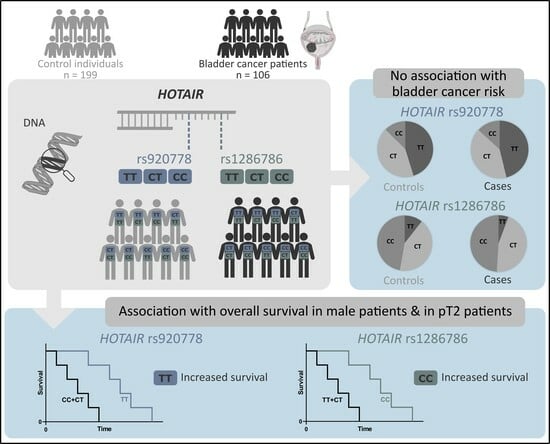Share and Cite
Martins, E.P.; Vieira de Castro, J.; Fontes, R.; Monteiro-Reis, S.; Henrique, R.; Jerónimo, C.; Costa, B.M. Relevance of HOTAIR rs920778 and rs12826786 Genetic Variants in Bladder Cancer Risk and Survival. Cancers 2024, 16, 434. https://doi.org/10.3390/cancers16020434
Martins EP, Vieira de Castro J, Fontes R, Monteiro-Reis S, Henrique R, Jerónimo C, Costa BM. Relevance of HOTAIR rs920778 and rs12826786 Genetic Variants in Bladder Cancer Risk and Survival. Cancers. 2024; 16(2):434. https://doi.org/10.3390/cancers16020434
Chicago/Turabian StyleMartins, Eduarda P., Joana Vieira de Castro, Rita Fontes, Sara Monteiro-Reis, Rui Henrique, Carmen Jerónimo, and Bruno M. Costa. 2024. "Relevance of HOTAIR rs920778 and rs12826786 Genetic Variants in Bladder Cancer Risk and Survival" Cancers 16, no. 2: 434. https://doi.org/10.3390/cancers16020434
APA StyleMartins, E. P., Vieira de Castro, J., Fontes, R., Monteiro-Reis, S., Henrique, R., Jerónimo, C., & Costa, B. M. (2024). Relevance of HOTAIR rs920778 and rs12826786 Genetic Variants in Bladder Cancer Risk and Survival. Cancers, 16(2), 434. https://doi.org/10.3390/cancers16020434







